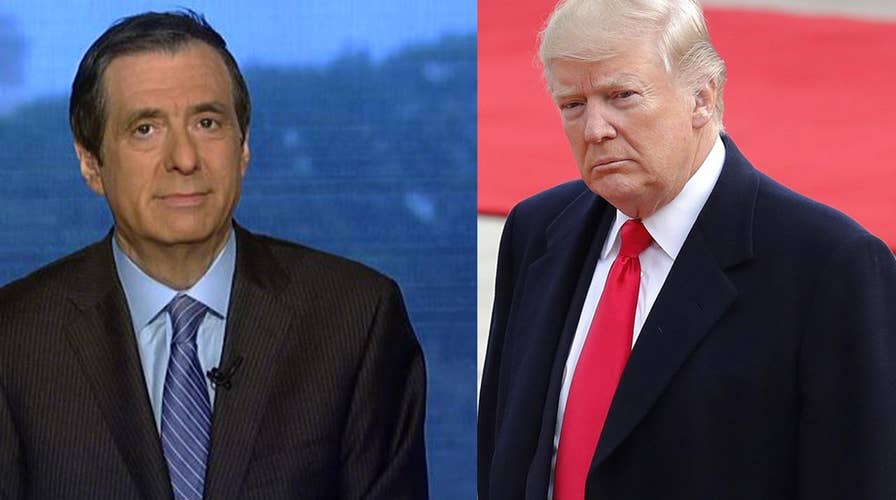Kurtz: President Accuses Press of ‘Disinformation Campaign’
Howard Kurtz weighs in on President Trump's accusations against the press and its 'disinformation' campaign.
With 15 tweets in the last five days on what he’s calling the “Rigged Russia Witch Hunt,” President Trump is not just playing defense but keeping the investigation in the forefront of the news cycle.
Just yesterday, for instance, the president said that Bob Mueller’s team—which he describes as “13 Angry Democrats,” plus people who worked for Barack Obama, “will be MEDDLING with the midterm elections.”
Now I’m not clear exactly how these folks will be interfering with the 2018 elections, unless their mere employment in continuing the probe amounts to interference. But Mueller was, of course, hired by Trump’s Republican appointee, Deputy Attorney General Rod Rosenstein.
Obviously, it’s not a plus for Republicans trying to keep control of the House and Senate to campaign against the backdrop of the investigation, which could produce more indictments before Election Day.
But the president’s increasingly harsh criticism, while shoring up his base, has the paradoxical effect of drawing more attention to the probe itself. Every tweet (or comment) generates endless retweets, blog posts, news stories and cable segments.
It’s hardly unprecedented, by the way, to go after an independent prosecutor. Bill Clinton and his allies tried to do the same thing to Ken Starr two decades ago.
In addition to bashing the investigation, Trump’s tweetstorm is aimed at some of his favorite targets from 2016 and beyond.
Trump says he needs to focus on North Korea, trade and other issues, “not on the Rigged Russia Witch Hunt that should be investigating Clinton/Russia/FBI/Justice/Obama/Comey/Lynch etc.”
And: “Why didn’t President Obama do something about the so-called Russian Meddling when he was told about it by the FBI before the Election? Because he thought Crooked Hillary was going to win, and he didn’t want to upset the apple cart! He was in charge, not me, and did nothing.”
The president has also channeled his favorite network, tweeting: “‘The President deserves some answers.’ @FoxNews in discussing ‘SPYGATE.’” Spygate, involving the FBI informant who infiltrated Trump’s campaign, is the branding he’s tried, with limited success, to get the media to adopt.
And circling back to his favorite target:
“The Fake Mainstream Media has, from the time I announced I was running for President, run the most highly sophisticated & dishonest Disinformation Campaign in the history of politics. No matter how well WE do, they find fault. But the forgotten men & women WON, I’m President!”
That’s the first time I’ve seen Trump, for all his attacks on the media, accuse them of a disinformation campaign, which sounds far more organized than news organizations could pull off. That doesn’t mean they haven’t been overwhelmingly negative.
The Washington Times said yesterday that “while much of America wasn’t looking, President Trump and Congress actually have been getting some work done together.”
The story cites new rules on VA reform and experimental drugs, as well as a partial rollback of the Dodd-Frank banking law. The latter is an important deregulation step that erodes the Democrats’ main response to the 2008 financial crisis.
Neutering Dodd-Frank would be a big deal in a traditional administration. But it’s not surprising that such issues have been overshadowed by the on-again/off-again Korean summit, or by Trump’s Twitter assault against Mueller and the media.
The president could be laying the groundwork to blame GOP losses on a rigged system. But for now, he’s shining a white-hot spotlight on the very controversy he says is interfering with his job.













































